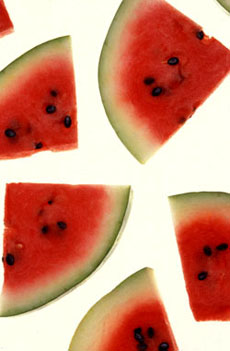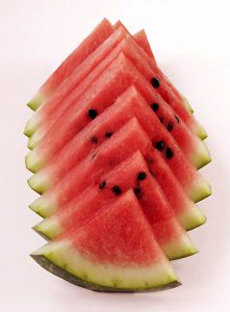

Wonderful watermelon: sweet, crunchy and full of antioxidants. Photo by Scott Bauer, U.S. Agricultural Research Service.
August 2010 |
 |
Watermelon Nutrition
Page 2: Nutrition Facts
This is Page 2 of a four-page article. Click on the black links below to visit other pages.
Watermelon Nutrition
Good news, watermelon lovers: Watermelon is highly nutritious, packed full of vitamins and antioxidants.
According to the Produce Marketing Association, watermelon:
- Contains 6% sugar and 92% water
- Two cups, diced, contain 80 calories
- Total carbohydrate is 27g: 25g sugar and 2g dietary fiber
- Two cups have 25% Daily Value of vitamin C, 20% of vitamin A, 2% calcium,
4% iron and 7% potassium, as well as vitamin B6 and B1 (thiamin)
- Two cups of fruit have 1g protein and 10mg sodium
- Watermelon has zero fat or cholesterol
Watermelon & Lycopene
Watermelon is one of the few foods that contain large amounts of the powerful phytochemical (antioxidant) lycopene—in fact, it’s the “lycopene leader,” with 40% more lycopene than red tomatoes, or about 9 to 13 milligrams of lycopene per 1-1/2 cups of fruit. (Other good sources of lycopene include red and pink grapefruit and guava.)
Lycopene is a red pigment that, in addition to giving watermelon, tomatoes and other fruits their red or rosy color, destroys the free radicals that impede proper cell function.
Lycopene is associated with reduction of some cancers and reduced risk of heart attack. It is a certified heart-healthy food by the American Heart Association.
Continue To Page 3: Watermelon Tips
Go To The Article Index Above
|
|

Enjoy a refreshing slice or two: It’s good for you. Photo by Mateusz Atroszko | SXC. |

|



